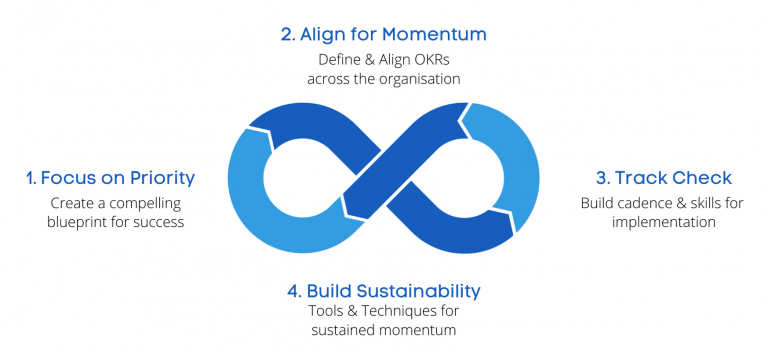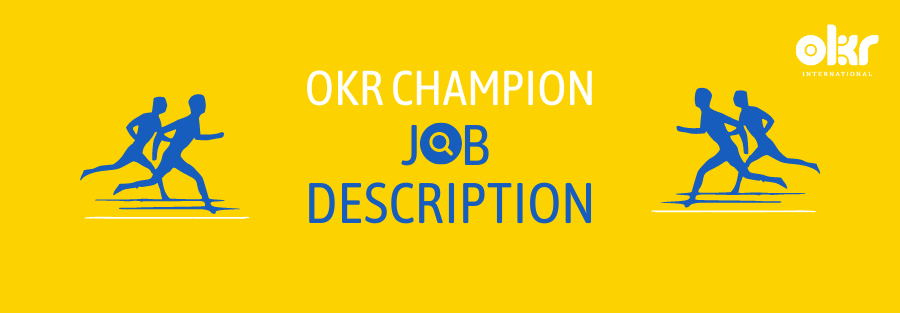OKR BOK™ - An Ethical Guideline
The OKR-BOK™ (Body of Knowledge) was developed to support the highest standards of practice in the field of Objectives & Key Results. OKR International is dedicated to developing professionals interested in practicing OKRs using the OKR-BOK™.
The OKR Body of Knowledge and its core competencies is designed as the industry gold standard in the helping OKR Practitioners practice OKRs within their organisation or with clients.
OKR BOK™ - Core Competencies & Ethical Guideline
The OKR-BOK™ and its related core competencies are grouped into four categories viz. OKR Framework, OKR Principles, OKR Process, and OKR Skills.
Supporting these core competencies at its very foundation is the OKR-BOK™ Ethical Guidelines that serves as the guiding code of conduct for the practice of OKRs.
OKR Framework
Focus on Priority: Understands how to help define organisational priorities by stitching the Organisational Vision, Mission, Values, Purpose and Strategy with the Strategic/Tactical OKRs for the organisation
Align for Momentum: Creating a transparent and engaged system that includes critical activities such as
- Creating a buy-in from people across the board
- Training your leaders and teams on OKRs and supporting skills
- Establishing visible cross-functional dependencies
- Validating OKRs
- Ensuring the top-down and bottom-up alignment of OKRs
- Choosing and Implementing the right technology.
Track Check: Working with stakeholders to establish ownership and role-model execution from the top. Building efficacy of execution within the OKR framework by choosing the right cadence and skills necessary for OKR planning & implementation. This includes key activities such as all-hands meetings, regular progress reviews, check-ins, and a fair system of tracking and grading progress.
Build Sustainability: Providing ongoing support systems including the OKR Implementation Guide, OKR Templates, Job Descriptions for OKR Champions, OKR Checklists and FAQs for teams.
OKR Principles
DNA of OKRs: Define key components of OKRs including Objectives, Key Results, and Initiatives.
OKR Standards: Define key standards for Objectives, Key Results, and Initiatives.
OKR Syntax: Defining and understanding the OKR Syntax.
OKR Setting Guidelines: Define and practice crafting types of Objectives, Types of Key Results, Value Based Key Results, Balancing OKRs and Aligning OKRs.
OKR Process
OKR Planning Process: Ability to define and implement the steps involved in planning OKRs.
OKR Implementation Process: Ability to define and support the steps involved in implementing OKRs. Prowess to set and maintain the right cadence frequency and discipline.
OKR Skills
Establishing Client Agreement: Partnering with the client (internal or external) successfully. The Ability to understand client needs and garner agreement with the client about the OKR training, coaching or consulting assignment and relationships.
Building Trust: Ability to generate a trustworthy working environment with the client by displaying integrity, adherence to ethical standards, creating a safe environment for people to learn and practice OKRs, make commitments and keep them, be authentic with all client communications, ask permissions wherever/whenever necessary and display respect for cultural and diversity related areas.
Growth Facilitator: Ability to catalyze client growth (individual & organisational level). Challenges client to set aspirational OKRs, provides all necessary resources and expertise, creates awareness and competency with client, coaches and trains the client whenever needed, provide timely feedback for development and celebrates wins with the client.
Appreciative Listening™ : Ability to listen in order to understand. Fosters the skills of listening for self and others. Uses appreciative listening during all client engagements be it OKR training, coaching or consulting related assignments. Considers the content and context of client conversations, reflects and paraphrases understanding of what the client is saying and feeling.
Maintaining Presence: Ability to be focused and present during client conversations both physically, mentally and emotionally.
Catalytic Questioning™ : Ability to ask provoking and catalyzing questions to move the client forward towards their goals. Knows when to ask what kind of questions and in general supports the client during coaching or feedback sessions through powerful questioning to create awareness, buy-in and movement forward.
Being an OKR Coach: Uses the principles and process of being coach-like in conversations during OKR goal setting and OKR cadence reviews. Ability to use coaching at the right moment as an effective tool to support learning and growth of the client.
Feedback/Feedforward Skills: Ability to provide open, honest, timely and constructive feedback to client at appropriate junctures of the OKR Planning and Implementation process.
OKR-BOK™ Ethical Guidelines
Introduction
The OKR-BOK™ Ethical Guidelines describes the core values of OKR International, and ethical OKR principles and ethical standards of behavior for all Certified OKR Practitioners (C-OKRP)™. Meeting these ethical standards of behavior is the foundation of the OKR-BOK™ core competencies. That is “Practices ethical guidelines: understands and consistently applies OKR-BOK™ ethics and standards.”
The OKR-BOK™ Ethical Guidelines serves to uphold the integrity of OKR International and the global OKR profession by:
- Setting standards of conduct consistent with OKR International’s core values and ethical OKR principles.
- Guiding ethical reflection, education, and decision-making.
- Providing the basis for OKR-BOK™ Ethical Guidelines training in C-OKRP™ programs.
The OKR-BOK™ Ethical Guidelines applies when Certified OKR Practitioners represent themselves as such, in any OKR activity within or outside their organisation. These guidelines act as a guide-post for Professionals who are acting in their different roles as OKR coach, OKR Champions, OKR Shepherds, or any other nomenclatures used for the planning and implementation of OKRs within their organisation or with their clients.
Certified OKR Practitioners who accept the OKR-BOK™ Ethical Guidelines strive to be ethical, even when doing so involves making difficult decisions or acting with honor. The following ethical guidelines are applied to the professional activities of Certified OKR Practitioners of OKR International:
Ethical Guidelines – Client Interactions
As a Certified OKR Practitioner (C-OKRP)™ by OKR International, I:
- Ensure that my Client(s) and/or Sponsor(s) understand the nature and use of OKRs as a goal setting and implementation framework, the benefits and limits of OKRs, confidentiality requirements, financial arrangements, and any other terms of the agreement.
- Create an agreement/contract regarding the roles, responsibilities and rights of all parties involved with my Client(s) and Sponsor(s) prior to the commencement of services.
- Maintain the strictest levels of confidentiality with all parties as agreed upon. I am aware of and agree to comply with all applicable laws that pertain to personal data and communications.
- Have a clear understanding about how information is exchanged among all parties involved during all interactions within the scope of OKR work and about the conditions under which information will not be kept confidential.
- Maintain, store and dispose of any data (hard copies or electronic files) created during my professional interactions to promotes confidentiality, security and privacy and comply with any applicable laws and agreements. Furthermore, I seek to make proper use of emerging and growing technological developments that are being used in filed of OKR and be aware how various ethical standards apply to them.
- Respect all parties’ right to terminate the OKR coaching/consulting relationship at any point for any reason during the process subject to the provisions of the agreement.
- Am aware of and actively manage any power or status difference between the Client and me that may be caused by cultural, relational, psychological or contextual issues.
- Assure consistent quality of OKR training / coaching / consulting regardless of the amount or form of agreed compensation in any relationship.
Ethical Guidelines – Performance as an internal/external practitioner
- Adhere to the OKR-BOK™ Ethical Guidelines in all my interactions. When I become aware of a possible breach of the Code by myself or I recognize unethical behavior in another C-OKRP™ Professional, I respectfully raise the matter with those involved. If this does not resolve the matter, I refer it to a formal authority (OKR International) for resolution.
- Require adherence to the OKR-BOK™ Ethical Guidelines by all Support Personnel internally or externally connected to the user organisation.
- Commit to excellence through continued personal, professional, and ethical development.
- Recognize my personal limitations or circumstances that may impair, conflict with, or interfere with my performance or my professional relationships. I will reach out for support to determine the action to be taken and, if necessary, promptly seek relevant professional guidance. This may include suspending or terminating my relationship(s).
- Resolve any conflict of interest or potential conflict of interest by working through the issue with relevant parties, seeking professional assistance, or suspending temporarily or ending the professional relationship.
- Identify accurately my OKR qualifications, my level of competency, expertise, experience, training, certifications and C-OKRP™ Credentials.
- Make verbal and written statements that are true and accurate about what I offer as a Certified OKR Practitioner by OKR International.
- Communicate and create awareness with those who need to be informed of the ethical responsibilities established by this Code.
- Do not participate in any sexual or romantic engagement with Client(s) or Sponsor(s). I will be ever mindful of the level of intimacy appropriate for the relationship. I take the appropriate action to address the issue or cancel the engagement.
- Avoid discrimination by maintaining fairness and equality in all activities and operations, while respecting local rules and cultural practices. This includes, but is not limited to, discrimination on the basis of age, race, gender expression, ethnicity, sexual orientation, religion, national origin, disability or military status.
- Recognize and honor the contributions and intellectual property of others, only claiming ownership of my own material. I understand that a breach of this standard may subject me to legal remedy by a third-party.
As a Certified OKR Practitioner by OKR International, in accordance with the OKR-BOK™ Ethical Guidelines, I acknowledge and agree to fulfil my ethical and legal obligations to my Client(s), Sponsor(s), colleagues and to the public at large.
If I breach any part of the OKR-BOK™ Ethical Guidelines, I agree that the OKR International in its sole discretion may hold me accountable for so doing. I further agree that my accountability to OKR International for any breach may include sanctions, such as mandatory additional training or other education or loss of my C-OKRP™ Certification credential.









